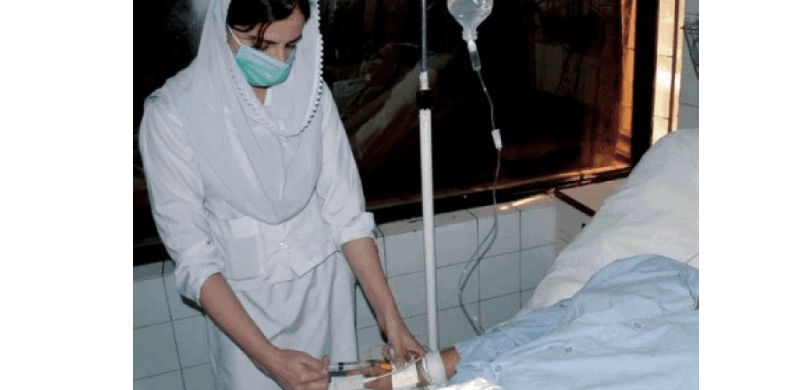
Pakistan is facing an acute shortage of nurses and requires 1.3 million more to fill the void, reported Express Tribune on Thursday.
During the International Nurses Day ceremony held at the institute in collaboration with International Committee of Red Cross (ICRC), Khyber Medical University Institute of Nursing Sciences (KMU-INS) Director Dr Dildar Muhammad said that Pakistan needed more nurses to cater healthcare needs of the population.
Dildar Muhammad said that Pakistan needed 1.3 million more nurses according to standards set globally, but the country would not compromise on quality to fill the numbers.
Dr Parveen Ali, from the University of Sheffield, stressed on the need to introduce evidence-based nursing practices. Faridullah, deputy director nursing emphasised that nursing directorate is working on the service structure of nurses as well for the timely promotion of nurses to next grades.
According to a report in 2018, Sindh faced the worst health crisis as the provincial healthcare facilities had a shortage of at least 5,307 doctors and paramedical staff, thus disrupting the functioning of the district headquarters hospitals (DHQs).
According to reports, the sanctioned strength of doctors and paramedical staff in the province stood at 67,876 against which some 62,569 are working and while there is a shortage of 5,307 doctors and paramedics.
The vacant positions include 2,929 doctors of general cadres, 492 doctors of specialist cadre, 129 dentists, 10 pharmacists, nine drug administrators, 210 nurses, 1,214 paramedics and 1,295 LHWs.
During the International Nurses Day ceremony held at the institute in collaboration with International Committee of Red Cross (ICRC), Khyber Medical University Institute of Nursing Sciences (KMU-INS) Director Dr Dildar Muhammad said that Pakistan needed more nurses to cater healthcare needs of the population.
Dildar Muhammad said that Pakistan needed 1.3 million more nurses according to standards set globally, but the country would not compromise on quality to fill the numbers.
Dr Parveen Ali, from the University of Sheffield, stressed on the need to introduce evidence-based nursing practices. Faridullah, deputy director nursing emphasised that nursing directorate is working on the service structure of nurses as well for the timely promotion of nurses to next grades.
According to a report in 2018, Sindh faced the worst health crisis as the provincial healthcare facilities had a shortage of at least 5,307 doctors and paramedical staff, thus disrupting the functioning of the district headquarters hospitals (DHQs).
According to reports, the sanctioned strength of doctors and paramedical staff in the province stood at 67,876 against which some 62,569 are working and while there is a shortage of 5,307 doctors and paramedics.
The vacant positions include 2,929 doctors of general cadres, 492 doctors of specialist cadre, 129 dentists, 10 pharmacists, nine drug administrators, 210 nurses, 1,214 paramedics and 1,295 LHWs.
